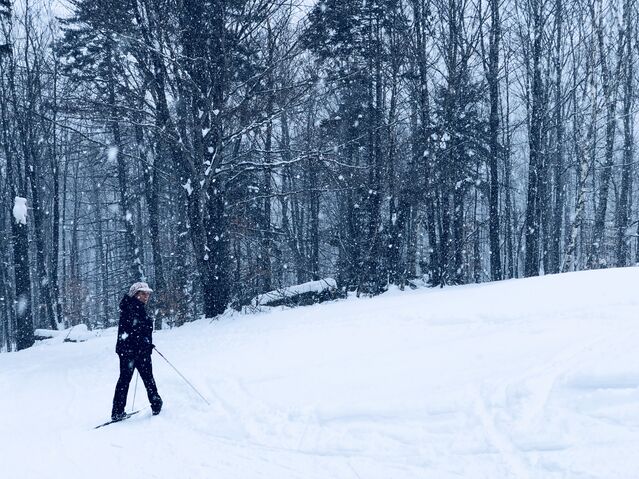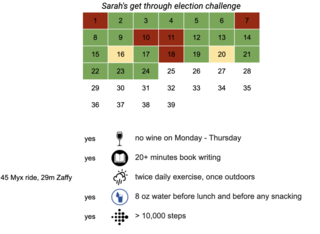
This summer was a welcome respite from the long months indoors closed off from so many faces that I love.
It was deeply gratifying to have friends over for outdoor dinners and drinks on the porch. Even if at separate tables with some feet between us, I could feel the warmth of companionship right down to my toes.

To gather with beloved others outdoors to hike and kayak and splash in the waves.
To hold a new niece for the first time.
It wasn’t everything. But it was a whole heck of a lot.
Now as the days grow shorter and the New England temperatures begin their steady decline, the virus is surging both locally and nationally, and also creeping in on those I love, in what feels like a tight net drawing closer and closer.
First, my parents’ favorite restaurant closed for an outbreak. Then cases started springing up where I teach. Where my daughter goes to school. My in-laws’ tennis club. A charitable organization whose board I serve on. The significant other of someone who regularly interacts with my brother and parents.
Closer and closer, circles drawing ever nearer.
Unlike the spring surge which seemed to largely be driven by larger superspreader events and residential settings (Boston’s Biogen conference, nursing homes, meatpacking plants), contact tracing reveals that in my state, the current surge is being driven by small indoor gatherings among friends and family.
Meanwhile, Dr. Fauci says Thanksgiving might be off the table, and my governor is urging people in our state to avoid mixing households at indoor gatherings whenever possible.

I felt despair creeping in from the corners, the thought of cold dark months without breaking bread and sharing drink and laughter with my cherished social others.
Surviving winter
One afternoon when I was feeling this encroaching despair, I ran into two helpful articles in a row that lifted my spirits.
Both had the same essential message — we need to embrace the cold, to befriend winter.
The first was this article from The Cut: "The Dream of Winterizing Your Social Life." Written with the word equivalent of a soft camera filter, it paints a picture of cozy gatherings under white lights, draped in blankets, with hands full of whiskey (“free heat”) or toasty cocoa.
(It also warned that you might want to move on items like outdoor heaters, fire pits, and down blankets because they might be the winter 2020-2021 version of toilet paper and yeast.)
The second was this article from The New York Times: "What Scandinavians Can Teach Us About Embracing Winter," in which the author notes that these countries have some of the most brutal winters but the lowest depression rates. She credits it to something she calls a “positive winter mindset.” She writes, “This idea of coming together to celebrate the darkness outside is not only a COVID-19 friendly way to gather, it can be deeply meaningful. Lighting a flame — whether candles inside or bonfires outside — becomes a mindful moment, an opportunity to pause and enjoy.”
In one of my group texts (actually a Slack, I just don’t want to nerd out too much here), I shared these articles. The amazing group of women I tackle most of life’s tangles with immediately started sharing resources and links and ideas. For down blankets, wearable ponchos, fingerless gloves, patio heaters, solo stoves, little white lights to get some of that dreamy ambiance.
None of it is free, but much of it is inexpensive. Since my household is privileged enough to still be employed, I plan on using the funds I would have otherwise used for travel and for eating out.
We also need to remember how exhilarating cold, outdoor activities can be. How they challenge us. How drawing in deep lungfuls of cold air can refresh and renew. How resisting the elements can puff you up and make you feel powerful.

I don’t know if even my family’s luckily flexible schedules will allow for a true pod situation, but if my daughter’s school pivots fully remote again in the deep midwinter (right now she’s in-person two days a week), I plan on doing some judicious quarantining with likeminded, like-flexible-scheduled friends in order to make occasional indoor dinners possible.
I know I won’t be able to convince all of my friends and family to sit outside with me in January to catch up around a small fire over some mulled wine, down blankets, and little white lights.
But I’m hoping to convince enough of them to take some of the edge off of the social isolation.
Surviving the election, the election aftermath, and all of the rest of the doomscrolling.
So much of what is emotionally challenging right now has to do with how uncertain everything is. Who will emerge victorious on November 3rd — and will it be joyous or crushing? What will those previously-boring, now-potentially-dangerous months in between election day and inauguration day portend? What latest atrocity, what new virus development, what climate catastrophe?
Life right now is enough to lead to a constant simmering sense of anger and outrage.
I feel it. But I’m not set up well to deal with constant anger and constant uncertainty. I need to feel it, let it motivate some civic action, and then find a way to dispense with it.
My first approach to regulating these emotions is always my main approach, which is escaping into fiction.
My second, more recent, election-specific approach might be more broadly helpful, and that is to control what I can, in a measurable way. With that same group of women I mentioned earlier, we are running a “get through the election” challenge.
A little over a month before the election, we each chose five daily goals to meet that were under our control — both to feel like something was under our control but also to mark and measure, note progress, and to shore up well-being in a difficult time. We chose goals like daily dancing, no technology 45 minutes before bed, to get outdoors.
I thought it would be helpful. It is instead life-altering. I thoroughly recommend it.
Here’s mine:

This was inspired by a friend’s 75-day challenge that seemed too soul-killing — no carbs, no alcohol, no snacking. I prefer liveable challenges.
Surviving holidays
I wrote this essay in part because figuring out how to manage the challenges of November-to-spring is dominating all of my conversations with family and friends — people are sharing stories about conflicts with relatives who vary in their approaches to virus risks, angst over missing holidays and/or how to manage them in a safe way, worries about hurt feelings, and how to deal with the constant uncertainty that hangs over everything and all of us.
I think surviving the holidays is going to involve a lot of open communication. Lay it all out — who is comfortable with what, what are the benefits, what are the risks, how do they weigh against each other — and agree on a plan, and then stick to that plan.

I wish you health, happiness, and the best winter you can manage.
Before we know it, this swiftly tilting planet will tilt again and we’ll be on the other side, culling garlic scapes, turning over gardens, and otherwise appreciating the gifts of spring.




